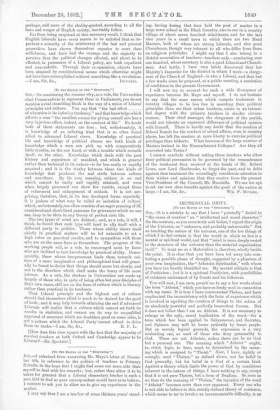tro THE EDITOR OF THE"SPECTATOR,"]
refrained from answering Mr. Mayo's letter of Decem- ber 4th, in reference to the politics of teachers in Primary Schools, in the hope that I might find some one more able than myself to deal with his remarks ; but, rather than allow it to be taken for granted that a Liberal elementary teacher is such a rare bird to find as your correspondent would have us to believe, I venture to ask you to allow me to give my experience in the matter.
I may say that I am a teacher of some thirteen years' stand-
ing, having during that time held the post of master in a large town school in the Black Country, also in one in a country village of about seven hundred inhabitants, and for the last nine years in a small town in which there are two Head Masters, both of whom are strong Liberals, and also good Churchmen, though very tolerant to all who differ from them on religions principles. I might say that I also belong to a district association of teachers—teachers only—numbering over one hundred, whose secretary is also a good Liberal and Church- man. And lastly, I have very lately discovered that her Majesty's Inspector for the district in which I work—a clergy- man of the Church of England—is also a Liberal, and that but a few weeks since he proposed, at a public meeting, a resolution of confidence in the present Government.
I will now try to account for such a wide divergence of experience between Mr. Mayo and myself. I do not hesitate to say that the same reason which compels tradesmen in country villages to be less free in asserting their political principles than are their urban brethren, exists in an intensi- fied degree with the primary teachers in similar circum- stances. Their chief manager, the clergyman of the parish, would not tolerate an expressed difference of political opinion with himself. There is hardly any doubt that the creation of School Boards for the conduct of school affairs, even in country places, has left the masters at more liberty to exercise political privileges than hitherto. What becomes of the large number of Masters trained in the Nonconformist Colleges ? Are they all converted into Tories ?
I cannot conclude without asking those teachers who allow their political persuasion to be governed by the remembrance of the treatment they received at the hands of Mr. Robert Lowe, DOW Lord Sherbrooke, to forget the past, and to debit against that treatment the exceedingly considerate attention to their wishes and opinions that they receive from the present Vice-President of the Council, Mr. Mundella. We are too apt to set our own class benefits against the good of the nation at

































 Previous page
Previous page